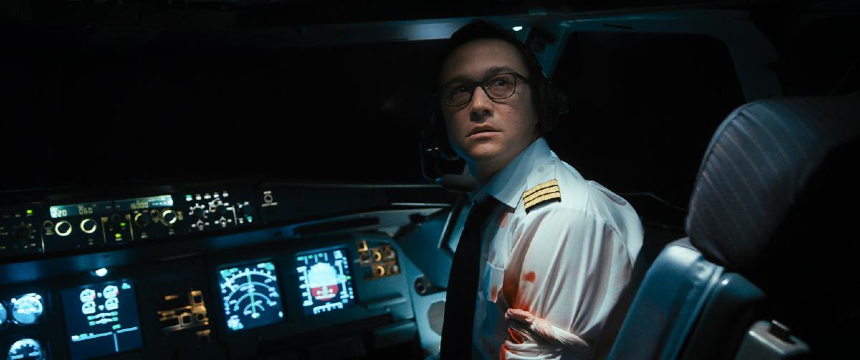Review: 7500 Delivers a Story Unworthy of Joseph Gordon-Levitt's Talents

Apparently, someone forgot to tell German-born writer-director Patrick Vollrath that it’s 2020 and not 2002, that relying on unreflective, xenophobic, Islamophobic stereotypes as the primary villains in 7500, an exploitative, 9/11-inspired, hijacking thriller filmed almost three years ago (it premiered last year at the Locarno Film Festival) starring actor Joseph Gordon-Levitt in comeback mode (his first role in four years), may no longer be appropriate, let along acceptable in a world facing resurgent right-wing nationalist and populist movements across Western Europe and the United States.
But to first-time, feature-length director Vollrath, working from a screenplay co-written with Senad Halilbasic, swapping out the villains in 7500 with another ethnic or racial group (or to be more accurate, no non-Caucasian ethnic or racial group at all), obviously wasn’t an option. It irrevocably sours what’s otherwise an efficient, economic thriller, a surprisingly effective, if ultimately strained use, of the budget-friendly, single-set plot device (a jetliner cockpit) to deliver obligatory thrills and maximize suspense.
When we first meet Gordon-Levitt’s character, Tobias Elias (one of only two characters with a surname), an American working for a German airline, he’s slipping into the cockpit of a Berlin-to-Paris jetliner as the co-pilot to the captain, Michael Lutzmann (Carlo Kitzlinger), a more experienced, senior pilot. Only 31, but with 10 years of flying commercial airliners on his curriculum vitae, Elias seems poised to get a promotion to piloting his own jetliner in the near future.
He’s all but settled down, sharing a relatively stable relationship with his fiancé, Gökce (Aylin Tezel), a Turkish-German flight attendant also working on the same flight (they have a 2-year-old child together). Vollrath and Halilbasic use the newness of Elias’ working relationship with Lutzmann as co-pilot/pilot and his romantic relation with Gökce as foundational plot elements meant to shed a glimmer of light into Elias’ personality and personal/professional lives.
That’s all set-up, of course, for the hijacking thriller that follows. Before 7500 hits the 18:00-minute mark, the aforementioned Muslim extremists make their move and storm the cockpit during meal service for the pilots. In the struggle, they incapacitate the captain and force Elias to take over flying the jetliner on his own. It becomes immediately clear to Elias, however, that the terrorists want to fly the jetliner into a population center, killing as many people as possible.
That leaves Elias forced to play the hero without leaving the cockpit. In a moment of hesitation and confusion, a wounded Elias regains temporary control of the cockpit, splitting off one terrorist, Vedat (Omid Memar), from his fellow terrorists outside the cockpit. Predictably, a life-or-death standoff develops between the seemingly under-matched Elias and the terrorists for the remainder of 7500’s tension-filled, swiftly moving running time.
Just as predictably, Vollrath and Halilbasic use Elias’ relationships (i.e., the captain, his fiancé) against him to both increase personal and professional stakes for Elias per Screenwriting 101 rules and push him ahead, however unwillingly, on the path towards heroism. As lazy and egregious as Vollrath and Halilbasic’s reliance on offensive stereotypes undoubtedly may be, they do themselves no favors by their ill-use of the Gökce character.
Presumably, making Gökce half-Turkish and thus, half-Muslim, is meant to offset any criticism of Vollrath and Halilbasic’s choice in villains (she’s a “good” Muslim, or rather half-Muslim, and they’re not), but her definition and treatment in the film suggest a casual, throwback misogyny in service of Elias’ heroic character (same as it ever was). Vollrath and Halilbasic obviously chose otherwise.
Assuming you can look past 7500’s politics aside (a big “if”), it’s just as clear that 7500 was written to fully leverage a limited budget, and given the practically singular focus on the cockpit through most of 7500’s 86-minute running time, as an actor’s showcase. At least in that respect, 7500 delivers on its implicit promise, giving Gordon-Levitt the opportunity to flex his actorly range and depth, thankfully minus the overly mannered, tic-heavy behavior or off-kilter accents that seem to have negatively impacted his career (e..g., Gordon-Levitt’s bizarre, off-putting accent in Oliver Stone’s Snowden and cartoon-version French accent in Robert Zemeckis’ The Walk the previous year).
Here, Gordon-Levitt gives one of the most naturalistic, believable performances of his career, albeit in service of a script and story that ultimately falls short of his talent as an actor. At minimum, though, 7500 serves as a timely reminder that the acclaim Gordon-Levitt understandably received earlier in his career was, if nothing else, completely justified.
The film is available to stream on Amazon Prime Video as of Thursday, June 18, 2020.







